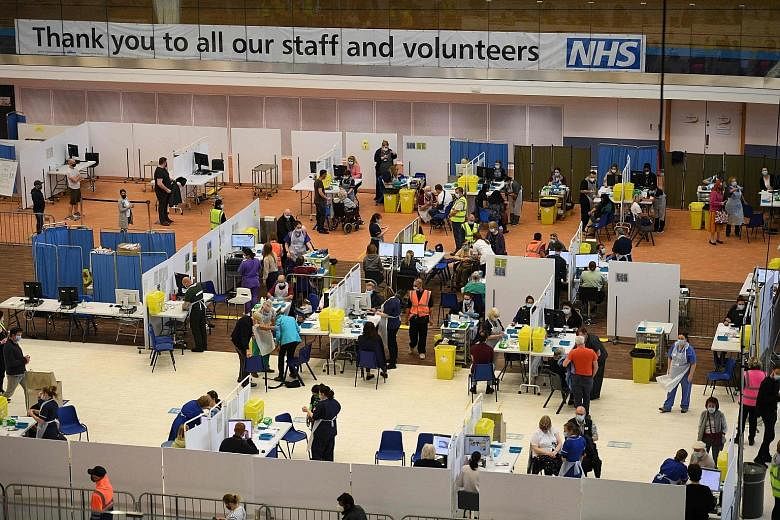NEW YORK • In January, Britain made a change to its vaccine guidelines that shocked many health experts: If the second dose of one vaccine was not available, patients could be given a different one.
The new rule was based on sheer guesswork; there was no scientific data at the time demonstrating that mixing two coronavirus vaccines was safe and effective. But that may change soon.
In February, researchers at the University of Oxford began a trial in which volunteers received a dose of the Pfizer-BioNTech vaccine, followed by a dose of AstraZeneca's formulation, or vice versa.
This month, the researchers will start analysing the blood of the subjects to see how well the mix-and-match approach works.
Mixing vaccines might do more than just help overcome supply bottlenecks. Some researchers suspect that a pair of different vaccines might work better than two doses of the same one. "I think we're on the cusp of some interesting data," said immunologist Adam Wheatley from the University of Melbourne in Australia.
The concept of mixing vaccines-sometimes called a heterologous prime-boost - is not new to our pandemic era. For decades, researchers have investigated the approach, hoping to find potent combinations against a range of viruses like influenza, HIV and Ebola.
Some of the early successes for heterologous prime-boosts came in the search for vaccines for Ebola. Many researchers focused their efforts on presenting the immune system with a protein found on the surface of the Ebola virus.
The gene for that protein was inserted into a different, harmless virus. When people received an injection of the vaccine, the harmless virus entered their cells; the cells then read the instructions in the Ebola gene and mass-produced Ebola's surface protein.
The immune system encountered the Ebola protein and made antibodies against it. And those antibodies protected the vaccinated people if they became infected with a full-blown Ebola virus.
This type of vaccine, called a viral vector vaccine, came with a big risk: The recipients might develop immunity to the viral vector after just the first dose. When the second dose arrived, their immune systems could swiftly wipe out the viral vector before it delivered its payload.
A number of vaccine makers sidestepped this potential threat by using different viruses for each dose. That way, the viral vectors in the second dose would be as new to the immune system as the first was.
In 2017, for example, researchers at the Gamaleya Research Institute in Russia created an Ebola vaccine whose first dose contained a virus called an adenovirus. The second shot used another virus, called vesicular stomatitis virus.
When the Covid-19 pandemic began last year, the Gamaleya researchers used a similar strategy to create vaccines against the new coronavirus. Studies revealed that the vaccine, now known as Sputnik V, provided a strong defence against Covid-19. In clinical trials, it was found to have an efficacy of 91.6 per cent. Sputnik V is in use in Russia and 56 other countries.
Recently, the Gamaleya institute joined forces with AstraZeneca, which makes its own Covid-19 vaccine. The Gamaleya and AstraZeneca teams have registered a pair of clinical trials in which volunteers will receive a dose of AstraZeneca's ChAdOx1 and another of Sputnik V's Ad26. A spokesman for AstraZeneca said one trial in Azerbaijan is under way, and a second, in Russia, is still under review by the country's ministry of health.
Another kind of Covid-19 vaccine tested contains the actual spike protein, rather than genetic instructions for it. Some of the vaccines contain the entire protein; others contain just a fragment. There are 29 protein-based vaccines for Covid-19 in clinical trials though none have been authorised yet.
Dr Wheatley and his colleagues have been testing protein-based vaccines in mice. They injected the full spike protein into the animals as a first dose. For the second dose, they injected only the tip of the spike, a region known as the receptor-binding domain, or RBD.
Dr Wheatley and his colleagues found that the mixture worked better than two doses of the spike or of the RBD.
The researchers suspect that the first dose produces a broad range of antibodies that can stick to spots along the length of the spike protein, and that the second dose delivers a big supply of particularly potent antibodies to the tip of the spike. Together, the assortment of antibodies does a better job of stopping the coronavirus.
Other combinations of vaccines may bring benefits of their own. Some vaccines, especially protein-based ones, do a good job of generating antibodies. Others, such as viral vectors, are better at training immune cells. A viral vector followed by a protein boost might offer the best of both worlds.
Dr John Moore, a virus expert at Weill Cornell Medicine, cautioned that there was no guarantee that clinical trials would reveal a benefit to mixing vaccines. In the search for an HIV vaccine, researchers tried combining viral vectors and protein boost without success, he noted. Still, he said, the story might turn out differently for coronavirus vaccines. "I'd like to see these studies done," he said. "Doing it in the Covid space is completely rational, but may not be necessary."
NYTIMES

